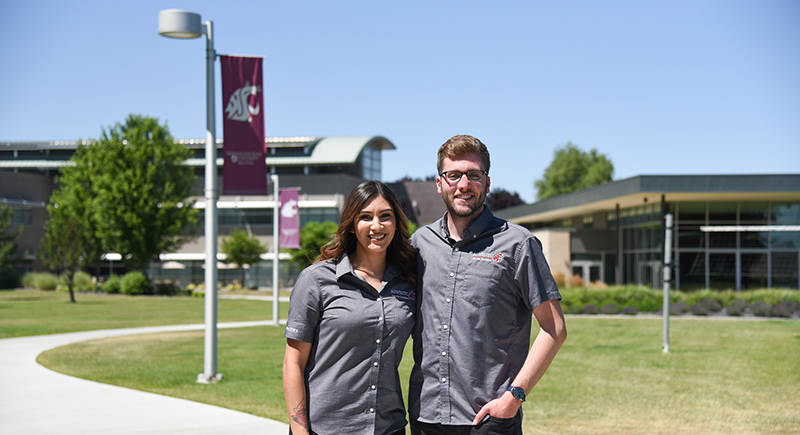
July 25, 2018 New ASWSUTC leaders to focus on student advocacy, positive changes
By Maegan Murray, WSU Tri-Cities
RICHLAND, Wash. – As part of their new leadership though the Associated Students of Washington State University Tri-Cities, President Zachary Harper and Vice President Savanna Kresse are changing the way that student government serves its students, focusing more on advocating for students and less on the promotion and hosting of activities and events.
Harper, a junior business major who served as the ASWSUTC vice president last year, and Kresse, a junior history major with a focus on pre-law who served as director of legislative affairs last year, are preparing a five-year plan, which they hope will lay a foundation for positive changes to the structure by which they can serve students through warranted systematic and structural improvements. They also hope that their plans will better improve how ASWSUTC interacts with students and how ASWSUTC communicates student wants and needs to university administration.
“We really are a transitioning organization,” Harper said. “Because we are a small but growing campus, we have to adapt to what is available to us, as well as where we want to see this organization head. Because of our recent growth and now that we have a new chancellor, we are focusing more on advocacy and changes for students. We anticipate that the big changes will improve the structure for our students, and as a result, our campus.”
Positive change
Part of their first work in their new positions is to separate the student entertainment board from student government so that the SEB organization can more efficiently focus on student events and entertainment. Before, the student entertainment board, which is responsible for booking and hosting student entertainment options, was merged with ASWSUTC, and some of the work was blurred between the two organizations. As a result, ASWSUTC was seen more of an events-based organization. Although ASWSUTC will continue to host events, their goal will be to make sure those events cater to the larger student body and that they serve a purpose for the overall student voice.
And secondly, they are removing the position of director of student affairs and are repurposing that position’s duties onto the student senators for each of the academic colleges.
“The student senator positions have been more of a rubber stamp in years past for things that we want to accomplish,” Kresse said. “We are changing the way that they work within the organization and are giving them more responsibility.”
Advocating for students
As far as advocacy, they hope to request more student feedback and discussion on issues ranging from small to large. Kresse said examples could range from identifying more healthy options for the campus café to larger topics like the type of legislation that ASWSUTC would like to fight for and support.
“We hope to utilize things like the student survey, which has one of the largest responses of any of the things we do on campus, to identify those needs and challenges and then using our improved ASWSUTC structure to tackle those things, including big-picture items,” she said.
And some of those big-picture ideas could be in identifying needs that students may not voice, but that are needed for the campus.
“Some of those unspoken needs could include advocating for additional classroom space, components of a diversity center to better represent and provide resources for WSU Tri-Cities’ diverse student community and more,” Harper said. “These are things that are in the realm of student affairs and that students may not specifically state that they want, but are needed.”
Revamping communication
Harper said ASWSUTC is also in the process of revamping their website, which, beginning this fall, will feature the ASWSUTC meeting minutes, current resolutions they’re working on, upcoming initiatives and more, in order to better connect with students about the things they are working on.
Steps for the future
Harper said with these changes, they hope ASWSUTC’s work will be a lot more meaningful and will set students up for success into the future.
“We want to address the issues of what students are facing, but also the struggles that the university administration has in meeting those struggles,” Kresse said. “These are the first steps in that overall process.”
Harper and Kresse said they hope to present their five-year plan to university administration beginning in August, and then to students later in the year, where they will welcome feedback.





